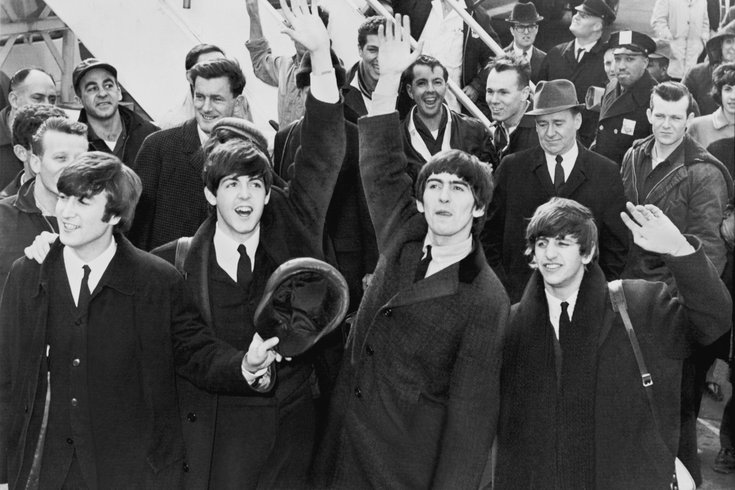
April 04, 2024
 Library of Congress/Prints & Photographs Division
Library of Congress/Prints & Photographs Division
The Beatles dominated the Billboard Hot 100 chart in on April 4, 1964. One of their hits, 'She Loves You,' was originally was released months earlier by Philly's Swan Records to little reaction.. This image shows John Lennon, Paul McCartney, George Harrison and Ringo Starr arriving at Kennedy Airport in New York on Jan. 1, 1964.
Six decades ago, the Beatles achieved a first in Billboard chart history. On April 4, 1964, the band occupied the top five positions on the Hot 100, edging out the likes of the Temptations and Beach Boys for their enviable chart domination.
This was at the beginning of Beatlemania in America, a phenomenon ignited just two months earlier by the group's appearances on "The Ed Sullivan Show." In mid-1964, everyone was looking to cash in on the British imports — much to the annoyance of a small Philadelphia label, which had released one of their chart toppers the previous year to a resounding thud.
The label was Swan Records, and one of its founding partners was already a legend on the local music scene. Dick Clark formed the company in 1957 with his "American Bandstand" producer Tony Mammarella and Bernie Binnick, a former salesman. The goal was to have a hand in as many parts of the music business as possible, an aim that would backfire two years later when both Clark and Mammarella got caught up in a payola scandal that ultimately forced Clark to divest. Before that fallout, the TV host owned 50% of the company.
The label recruited local talent, like Allentown teen Bobby Baker and Mary Swan, a West Catholic High School student. Its duo Billy & Lillie charted twice, but one of Swan's biggest stars was Freddy Cannon. The young rocker climbed to No. 6 on the Billboard Hot 100 in 1959 with "Tallahassee Lassie" and then to No. 3 in 1962 with "Palisades Park." (Clearly, he loved maps of America.)
Freddy Cannon, however, was peanuts compared to the impending British Invasion. "She Loves You" fell into Swan Records' lap in 1963, when John Lennon, Paul McCartney, George Harrison and Ringo Starr were already fleeing mobs of fans in London. Despite the pandemonium, American record execs were hesitant to bring the group's music stateside.
The Beatles had signed with the British label EMI, which had acquired the U.S. hitmaker Capitol Records in 1955. That gave Capitol Records a first look at EMI talent, but it had passed on the Beatles, insisting a British rock band couldn't make it in America. Instead, small labels got a shot at licensing the Fab Four's singles.
As Jerry Blavat, the hitmaker radio disc jockey who also danced on "American Bandstand," later recalled, "She Loves You" was shopped to not only Swan but another Philly label, Cameo-Parkway Records. The two companies, according to Blavat, once shared an office on Locust Street, and they were both run by men named Bernie. Only one, however, wanted to work with the Beatles.
"Bernie Lowe at Cameo-Parkway Records was not interested in The Beatles," Blavat told Larry Kane for "When They Were Boys," a book on the band's early years. "But Bernie Binnick, he was a former shoes salesman in Philadelphia, was very interested, and released 'She Loves You' on his Swan Records label September (16), 1963."
The release seemed to prove Lowe right, for as Blavat acknowledged, the single was "fairly invisible on the radio." Binnick apparently turned to Clark for help, pushing the track for consideration on "American Bandstand." But according to music historian John A. Jackson, Clark was unimpressed with the Beatles. He did eventually play "She Loves You" on the show's "Rate-A-Record" segment, where it "didn't fare that well," Clark remembered. The teens rated it in the low 70s out of 98.
Binnick's investment went nowhere until the following year, when the British Invasion was televised. American news stations had begun running stories on the overseas phenomenon in late 1963, but in January 1964, Jack Paar kicked off the chaos by playing footage of the Beatles performing "She Loves You" on his Friday night NBC show, a full month prior to their legendary "Ed Sullivan Show" appearances. As Binnick recalled, "The record exploded the following Monday."
"She Loves You" finally had momentum, but the late bump was actually devastating for Swan Records. Per the terms of its licensing agreement, the label had the option on future Beatles' songs only if it sold 50,000 copies of "She Love You" in the first four months of its release. Clark apparently needled Binnick years after the fact, asking him why he didn't just buy the 50,000 records himself. Binnick was quick to remind him that he and everyone else had dismissed the single the first go-around.
Swan Records never got another shot at the Beatles, and struggled to stay afloat in the years after its brush with fame. But its Philadelphia shoe salesman president was one of the first Americans to see potential in the mop-topped boys from Britain, many months before they set America ablaze.
Follow Kristin & PhillyVoice on Twitter: @kristin_hunt
| @thePhillyVoice
Like us on Facebook: PhillyVoice
Have a news tip? Let us know.